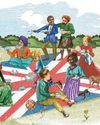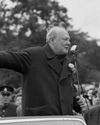
One August morning in 1346, an English army led by King Edward III slumped, exhausted, on a bloody battlefield in northern France, near the forest of Crécy. During the previous two days, the English had destroyed a larger, fresher army commanded by the French king Philip VI. The fighting had been vicious: at least 1,500 French knights lay dead, along with thousands more ordinary soldiers. “Never since the destruction of great Troy had there been such mourning,” wrote one poet.
Edward had pulled off a near-miraculous victory. It was several years since he had first claimed to be king of France as well as England, fuelling the struggle that today we call the Hundred Years’ War. Now his cause was vindicated: Philip VI was on the ropes, and Edward just had to decide how to strike his next blow. Or rather, where.
The road to the battle of Crécy had been hard. On 12 July, Edward – accompanied by his 16-year-old eldest son, the ‘Black Prince’ – had landed 15,000 troops on the beaches of Normandy. For six weeks this vast army had marched through France. At first they had rampaged: burning their way through the Norman countryside in a campaign of terror known as a chevauchée. Then they had gone on the run, chased by Philip’s army, who were determined to drive them out of France for good.
Denne historien er fra November 2023-utgaven av BBC History UK.
Start din 7-dagers gratis prøveperiode på Magzter GOLD for å få tilgang til tusenvis av utvalgte premiumhistorier og 9000+ magasiner og aviser.
Allerede abonnent ? Logg på
Denne historien er fra November 2023-utgaven av BBC History UK.
Start din 7-dagers gratis prøveperiode på Magzter GOLD for å få tilgang til tusenvis av utvalgte premiumhistorier og 9000+ magasiner og aviser.
Allerede abonnent? Logg på

The King They Couldn't Kill -Want to know why Henry VII is remembered as an intensely suspicious king, wracked by paranoia? The answer, writes Nathen Amin, lies in his death-defying rise to power
Henry’s wary nature is typically attributed to his shaky claim to the throne. The first Tudor monarch was unable to escape the taunt that he was a usurper with no right to call himself king. In fact, his renowned paranoia was the inevitable consequence of a traumatic youth – a trait ingrained long before he harboured ambitions to wear a crown. If we delve deeper into Henry’s background, we can draw a fuller picture of one of our most circumspect of monarchs – one that might elicit sympathy for a long misunderstood king.

The Spy Who Hoodwinked Hitler - Dummy tanks at El Alamein. Bogus generals in Algiers. Sham armies on D-Day. All were ruses masterminded by Dudley Clarke. Robert Hutton tells the story of the British soldier who made an art form of duping the Nazis
Examining the reconnaissance photos, Behrendt was convinced that the Allies weren’t in any hurry. They were constructing some kind of pipeline towards the southern end of their line, probably to carry water, which was barely halfway completed. There were supply dumps appearing in the south as well – always a telltale clue about where an attack would come. True, a large number of trucks were parked at the northern end of the line, about 25 miles back from the front, but they hadn’t moved for weeks.

"People have achieved all kinds of crazy things at the age of 18″
ALICE LOXTON talks to Danny Bird about her book on 18 individuals who left an indelible mark on British history before they were out of their teens

Parthian chicken
ELEANOR BARNETT recreates an ancient Roman dish that borrowed flavours from a rival neighbouring empire in the Middle East

"We need a meaningful story for the new generation - our composite union"
WHAT A SUMMER IT’S BEEN SO FAR, WITH AN astonishing election result.

A Pole apart
ROGER MOORHOUSE is absorbed by a little-known but politically significant Polish princess whose life encompassed the major events of the later 18th and 19th centuries

Medieval England's p olitical miracle
From Magna Carta to parliament, taxation to the law courts, the 13th and 14th centuries laid the foundations for the modern British state

EASTERN PROMISES
Lured by rich trading prospects, from the 17th to the 19th centuries Britain attempted to cultivate relations with China sometimes successfully, but often disastrously. Kerry Brown explores the troubled but ultimately vital links between two ambitious realms

THE GENIUS IN THE SHADOWS
Æthelstan is one of the greatest of all Anglo-Saxon monarchs. So why, asks Michael Wood, does the first king of the English remain so fiendishly elusive?

The long road back The election was tough for the Conservatives - but the past holds clues on how parties can return from the brink
It’s election night 1997, and Jeremy Paxman is grilling Tory grandee Cecil Parkinson.